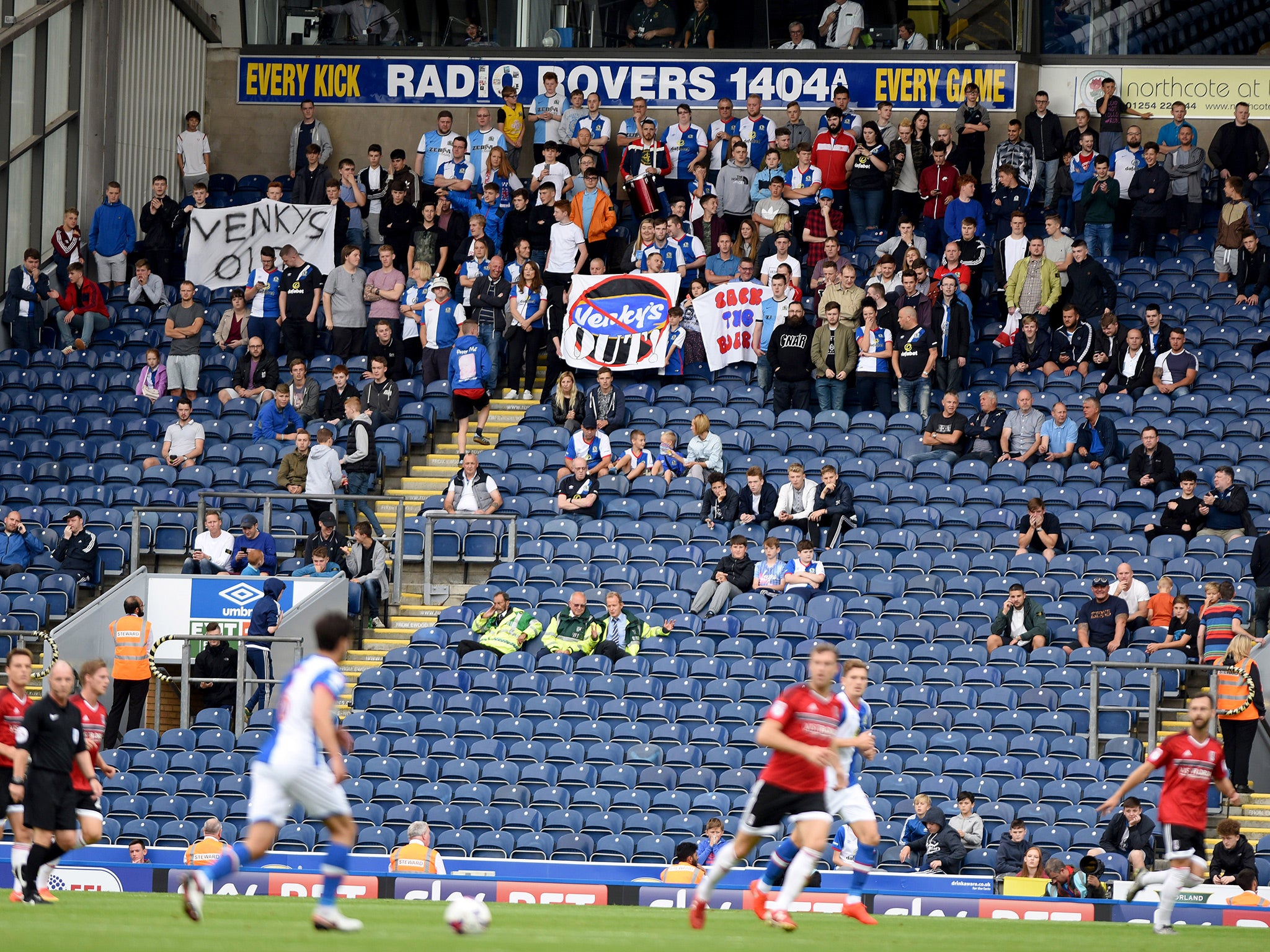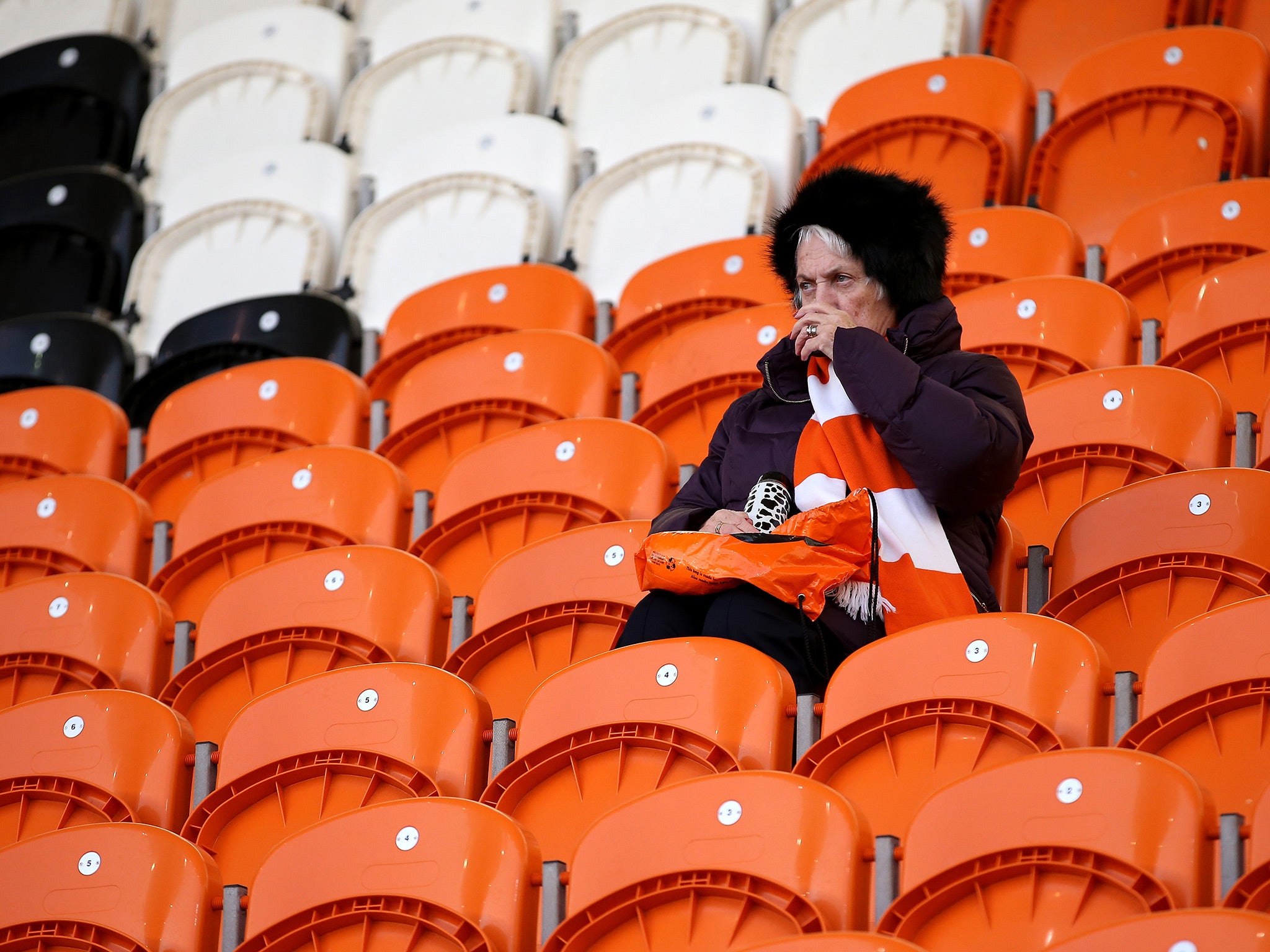Why Blackburn and Blackpool's FA Cup boycott is the most important fan protest for years
In a remarkable display of cross-club solidarity, supporters will finally prove they can hit ruinous owners and careless authorities where it hurts

Cast an eye over the first finals of the world’s oldest club competition, passing the several public school and university teams that dominated those early years, and you come across some more recognisable names. These are the clubs of the late-Victorian industrial north and Midlands, English football’s heartland, and up until 1891, one dominates.
Blackburn Rovers won the FA Cup five times before the turn of the century, with their sixth following in 1928. Ewood Park’s highest attendance to date came a year after, when 62,522 watched the holders draw with Bolton Wanderers in a sixth round tie. This weekend, another Lancastrian side will visit in the competition’s fourth round, and if some supporters had their way, there would be a record turnout of a different kind. Ewood would be empty.
Not just the home end, either. Blackpool are the visitors on Saturday and fans of both these embattled clubs are encouraging a mass boycott. The hope is that a local derby which would have attracted a gate surpassing 20,000 under normal circumstances instead plays out to a crowd so small that even Sean Spicer would struggle to excuse it.
Outside the ground, meanwhile, demonstrations will be held against the well-documented incompetence of the two clubs’ owners - Blackburn’s Rao family, known colloquially as ‘Venkys’, the name of their processed chicken meat empire, and Blackpool’s Oystons.
“There was talk spreading between the fan bases at both clubs that they wanted to do something at this game,” explains Mark Fish, the group chairman of the BRFC Action Group. “We've been in negotiations with Charlton, Coventry and Blackpool - a group of us - talking all year about what action we can take against the football authorities.” From the moment the draw was made, this boycott became inevitable.
Such tactics have already proved effective on the Fylde coast, with Blackpool playing every single one of their home matches this season against a backdrop of largely empty seats, made only more conspicuous by their pungent tangerine colour. The club’s recent history is a vaudeville farce worthy of a place on the town’s promenade. The Oystons’ stewardship has been so woeful, it provides one of five examples in Wikipedia’s short entry for ‘managed decline’.
“It's a cash rich club, that's one of the paradoxes of it,” says Steve Rowland, chairman of the Blackpool Supporters’ Trust. “They made multi-millions out of our years in the Premier League and most of that has been lent loan-free to other Oyston group companies, it hasn't been put into the footballing side. They as owners show no ambition for us to get back to where we think we should be.
“I personally have not been going to home games for two seasons,” he adds. “No home games, only away games. We've been negotiating to pay on the gate at those clubs to minimise the revenue coming back to the Oystons.”
But the FA Cup, of course, does not work like that. Ticket revenues in the fourth round are split. 45 per cent of Saturday’s ticket sales will go to the Rao family, 45 per cent to the Oystons, and the remaining 10 per cent will line the pockets of the competition’s organisers. “We take issue with all three,” says Fish. “The Football Association have been asked and asked and asked to step in and help and they haven't done.”

This is why the joint-action is more than simply a protest against two cancerous regimes. It is also designed to hit English football’s governing body in the pocket too, for their neglect of these supporters. As Rowland points out: “There are fans out there who are stakeholders in what should be social enterprises but their clubs are being run by people who are not good custodians.”
“We've tried every avenue but it feels like the supporters of Blackburn Rovers are on our own at the moment, and Blackpool probably feel the same,” Fish adds. “We get no help from football's authorities, the clubs themselves are happy to let this disengagement continue and from our point of view, it's difficult to see where a resolution is going to be brought.”
We've tried every avenue but it feels like the supporters of Blackburn Rovers are on our own at the moment, and Blackpool probably feel the same.
All they can do is try, while hoping that their arguments break through to the more resistant elements within each club’s support base. Tensions are particularly evident on Blackpool’s side, with match-goers referred to as ‘scabs’ and ‘mushrooms’ by some pockets of anti-Oyston activists. Triumphalist news stories have appeared on the club’s website throughout the week declaring that tickets are ‘selling well’, with the latest figures suggesting as many as 1,200 will be present in the away end.
Perhaps a fully empty Ewood was always going to be difficult. Boycott organisers on both sides are keen to stress that those who wish to watch the game have every right to do so and are more than are welcome to protest before it. Nevertheless, they are also optimistic that a more modest target can be reached. “I think at this stage, it's possible that we could have more out than in,” Fish says. “We're confident about numbers.

“Personally, it’s a long time since I've missed a game, and there's nobody who actively, publicly opposes Venky's more than me,” he adds. “It's difficult to turn your back on your football club. It'll still be there when the new owners come in, it was there a long time before they came, and it's heart-wrenching to think that you're not going to an FA Cup fourth round home tie to Blackpool, a local derby at £10 a ticket.”
But Fish and many like him will boycott regardless, which is testament to the strength of feeling among both sets of fans. Whether Ewood is empty or not, and sadly it almost certainly will not be, the united front outside the ground will be a remarkable display of cross-club solidarity, of the kind which English football has always desperately lacked. Supporters are finally withdrawing their entry fees, the one point of leverage they will always have over club owners. Best of all, they are doing so together.
Join our commenting forum
Join thought-provoking conversations, follow other Independent readers and see their replies
Comments
Bookmark popover
Removed from bookmarks